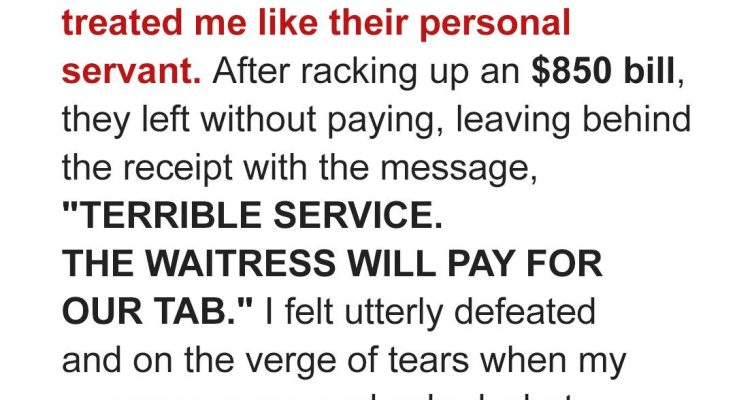When a family skipped out on their $850 restaurant tab, I was crushed. But with my manager’s quick thinking and a surprising ally, we turned the tables on them in a way they never saw coming.

If you’ve ever worked in the restaurant business, you’ve likely encountered your share of challenging customers. But this family? They were on a whole other level.
It started like any other bustling Friday night.
The restaurant was packed, and I was managing three tables when they walked in: Mr. Thompson, a burly man who carried himself with an air of entitlement; his wife, draped in a floral dress that probably cost more than my monthly rent; and their two teenage kids, glued to their phones without sparing a glance at anyone else.
From the moment they entered, it was clear they expected royal treatment.

“We want the best table by the window,” Mr. Thompson barked. “And make sure it’s quiet. Bring us extra cushions—my wife needs to be comfortable in these awful chairs.”
I glanced at the reservation list, hesitating. The window table was prepped for another party. Still, I forced a smile and replied, “Of course.” After rearranging things and hauling over cushions, I seated them, hoping that would be the worst of it.
But no. It was just the beginning.
The complaints started before they even opened the menus.
Mrs. Thompson wrinkled her nose dramatically. “Why is it so dim in here? Are we supposed to eat in the dark?”
I flipped on their table lamp and replied, “Does this help? We aim for an ambiance—”
“Ambiance?” she interrupted with a scoff. “Just make sure my glass is spotless. I won’t drink from something that looks used.”

I bit my tongue, retrieved her drink, and braced myself for more. Sure enough, Mr. Thompson grumbled, “What kind of restaurant doesn’t have lobster bisque on a Friday night?”
“We’ve never served lobster bisque here, sir,” I explained, keeping my tone even. “But we do have a fantastic clam chowder.”
“Forget it,” he huffed. “Just bring us bread, and make sure it’s warm!”
Back and forth, it continued. They snapped their fingers to summon me like I was a servant, demanded water refills before their glasses were halfway empty, and sent dishes back with exaggerated complaints.
“Is this what passes for service these days?” Mr. Thompson bellowed as he returned his steak for being “overcooked.” Mrs. Thompson shoved her soup at me, declaring it “inedible.”

By dessert, I was emotionally drained, trying hard to hold back tears. When their plates were cleared, I thought my ordeal was over. But when I returned with the bill, my stomach dropped.
They were gone.
In their place was a napkin with a hastily scrawled note: “Terrible service. The waitress will pay for our tab.”
The total was $850.
I stared at the napkin, my hands trembling, nausea rising. How could anyone be so heartless? My legs felt like jelly as I approached my manager, Mr. Caruso, who was overseeing another table.

He looked up, concern creasing his face. “Erica, what’s wrong?”
I handed him the napkin. “They left,” I whispered, barely holding it together. “They didn’t pay.”
He read the note, his expression unreadable. “An $850 bill,” I added, my voice shaking. “They just walked out.”
I braced myself for his reaction. Would he be angry? Call the police? Demand I cover the tab?
Instead, he chuckled. “Perfect,” he said, grinning.
“Perfect?” I echoed, dumbfounded.
“It’s an opportunity!” he exclaimed, his eyes lighting up.
“An opportunity for what?” I asked, still reeling.
“To make things right and get some good PR,” he replied, snapping his fingers.

Before I could respond, a nearby diner raised her hand. “Excuse me,” she said warmly. “Are you talking about the family with the loud guy and the floral-dressed woman?”
I nodded, exchanging a confused glance with Mr. Caruso. “Yes, why?”
She smiled. “I’m Nadine, a food blogger. I was recording my meal for a post and accidentally captured their behavior on video.”
My jaw dropped. “You did?”
She nodded, pulling out her phone. “They were so obnoxious, it was hard to miss.”
The footage showed Mr. Thompson snapping his fingers, Mrs. Thompson dramatically pushing her soup away, and their kids completely ignoring me. Nadine offered the video, saying, “Give it to the news station. This deserves to be seen.”

Mr. Caruso beamed. “You’re an angel. What dessert would you like? It’s on the house.”
“Chocolate lava cake!” Nadine declared with a laugh.
That night, as I recounted the ordeal for a local news crew, I felt a mix of nerves and resolve. “It’s not about the money,” I said. “It’s about basic respect.”
The news aired Nadine’s footage, carefully blurring the Thompsons’ faces, letting their actions speak for themselves. By the next morning, the story had gone viral. Support flooded in, with customers arriving in droves to show solidarity.
But then, during a busy lunch shift, the Thompsons returned.
Mr. Thompson stormed in, his face flushed. “Where’s your manager?” he bellowed.
Mr. Caruso stepped forward calmly. “How can I help you?”

“You released that footage! It’s defamation! We’re being harassed, and we’ll sue if you don’t retract it.”
Mr. Caruso folded his arms. “Sir, the footage didn’t reveal your identity. Feel free to call the police, but doing so would confirm it was you who skipped an $850 bill. Shall I dial for you?”
Mr. Thompson faltered, his face reddening further as onlookers started filming. Mrs. Thompson tugged at his sleeve. “Let’s just pay,” she hissed.
Reluctantly, he slammed his credit card onto the counter. “Fine,” he muttered. “And add a tip.”
“How generous,” Mr. Caruso said, his smile razor-sharp.

As the receipt printed, Mr. Thompson asked, “You’ll tell people we paid, right?”
Mr. Caruso’s grin widened. “We’ll see.”
The Thompsons hurried out, and the restaurant erupted in applause.
Later that evening, Mr. Caruso called me into his office. “Erica,” he said, “you’ve handled this ordeal with grace and professionalism. I’d like to promote you to assistant manager.”
Stunned, I accepted. Though the experience had been exhausting, I realized we had turned a terrible situation into a victory—and justice, in its own way, had been served.


